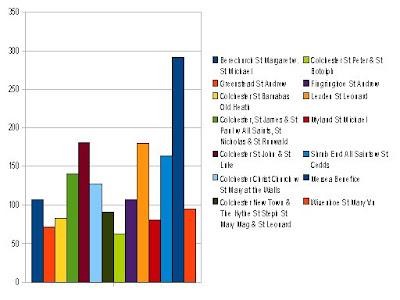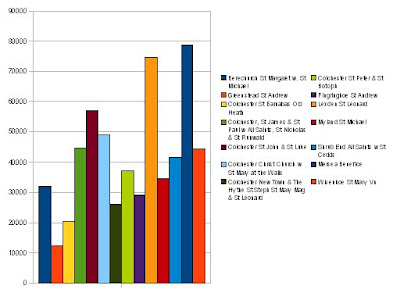And here’s one from yesterday afternoon:
Monthly Archives: December 2007
I feel a Maggie Thatcher moment coming on…
Just to explain that cryptic comment a few months ago
I’m coming to the conclusion that the present distribution of parish share, most particularly as it affects the Mersea Benefice, is unfair not proportionate or reasonable, and that this has consequences for both my health and the health of the communities in which I serve.
First graph, with Mersea in dark blue. This gives the relationship between parish share and stipendiary posts (ie diocese-paid) using 2007 parish share figures. St John’s pays the largest share but has two posts, hence they don’t show up so strongly.
Second graph, giving the relationship between full time posts and church membership size. This one is more intriguing, but the figures aren’t quite so reliable as they are a mix of usual Sunday attendance (for those churches that filled out the questionnaire for the Deanery Plan) or Electoral Roll, which is rather a different number. However the larger churches did fill out the forms, so if anything this graph exaggerates the size of the smaller churches. Again, bear in mind that St John’s is divided by two, although it is (only just, grin!) the largest church in the Deanery.
 This final table is simply re-ordering the data, using 2008 parish share figures, to give an indication of what each patch ‘pays’ for a clergyman. Again, bear in mind that the St John’s figure is half their parish share.
This final table is simply re-ordering the data, using 2008 parish share figures, to give an indication of what each patch ‘pays’ for a clergyman. Again, bear in mind that the St John’s figure is half their parish share.
Deanery Balance 2008
|
Name of Benefice |
2008 share/ftsp – ascending order |
|
Greenstead St Andrew |
12678.5 |
|
Colchester St Barnabas Old Heath |
21708 |
|
Colchester New Town & The Hythe St Steph St Mary Mag & St Leonard |
27456 |
|
Fingringhoe St Andrew |
31337 |
|
Berechurch St Margaret w. St Michael |
33528 |
|
Myland St Michael |
36880 |
|
Colchester St Peter & St Botolph |
40082.67 |
|
Shrub End All Saints w St Cedds |
42570 |
|
Colchester, St James & St Paul w All Saints, St Nicholas & St Runwald |
46918 |
|
Wivenhoe St Mary Vn |
48004 |
|
Colchester Christ Church w St Mary at the Walls |
52391 |
|
Colchester St John & St Luke |
60043.5 |
|
Lexden St Leonard |
79033 |
|
Mersea Benefice |
82587 |
A different way to put this is to say that the Mersea benefice transfers around £50k into the central pot. Or, to explore that from a different direction, the Mersea benefice is equivalent to two other benefices put together – say Shrub End plus Fingringhoe (which would then match the number and variety of churches).
Is this reasonable? It’s true that there is now a large staff team here, but a) the associate priest is paid for by the parish (ie not included in the above figures) and subsidised by a former member of the congregation, an arrangement which won’t last for ever; and b) the system is kept in place by the support of a number of retired clergy – and is it fair to expect the system to keep going on the backs of those who have already given their life in ministry to the church? And there are other questions as well – nobody I speak to disputes the need for the stronger parishes to support the weaker, but at what point does that obligation become fulfilled? If places like Mersea (and Lexden and St John’s) are the ones upholding the diverse ministry across the Colchester area, does that support need to be done in the way it presently is done, or can it be done differently? And what happens when the this transfer of wealth becomes directly damaging to the donors, ie it inhibits the strengthening and development of mission in their own communities? That sounds like a recipe for locking-in decline.
In other words, is the present system of parish share – a classic example of mid-20th century state socialism – the best way to support ministry, or would we be better off going back to a pattern of livings, whereby those ministries that were successful and prospered were able to reinforce their success by direct funding and control of further mission? My suspicion is strongly that the existing system will soon collapse (because of wider economic trends as much as anything else) and that more historic system will re-emerge. Then we shall have Mersea Minster as the central resource for discipleship and worship in the area south of Colchester. I find that prospect rather encouraging.
My ethical stance
With a h/t to Byron, and agreeing with his comment.
1. Aquinas (100%)
2. Aristotle (100%)
3. Plato (82%)
4. Ayn Rand (80%)
5. Spinoza (79%)
6. St. Augustine (74%)
7. Stoics (70%)
8. Nietzsche (70%)
9. David Hume (66%)
10. Cynics (62%)
11. Ockham (61%)
12. Kant (56%)
13. John Stuart Mill (54%)
14. Epicureans (51%)
15. Jeremy Bentham (46%)
16. Thomas Hobbes (41%)
17. Jean-Paul Sartre (40%)
18. Prescriptivism (32%)
19. Nel Noddings (24%)
Take the test here.
TBTM20071215
TBTE20071213
TBTM20071214
TBTM20071213
TBTE20071212
Eager longing (December Synchroblog)
We have three small children – the eldest just five and a half – and you can imagine the sense of anticipation that is building as Christmas hoves into view. Now, given my views on commercial culture (see my LUBH talks) you might think that the way in which the children are so focused on ‘presents’ is something to be repudiated or frustrated. And yet, there is something here that is worth redeeming. And that is hope.
For what the kids are doing is looking forward to something. They don’t know quite what it is – they’ve had all sorts of hints – but they are excited by it all, and it all seems a little bit magical. And then there is the day itself, with lots of celebrations and opening of presents and lots and lots of fun.
Now it may well be that the attention given to presents – most especially the attention given to the receiving of presents, rather than the giving – is something that needs to be grown out of. But what is now clear to me is that this time is all about the hope and longing for something to come into a life – and that it is very important and healthy to nurture that hope.
Imagine that such things were squashed and made pious; that such longings were replaced by more acceptable and formulaic religiosity. Something utterly essential would be lost. For that eager longing is something needed in our world. Some sense of possibility – that things will soon change – that we can achieve or obtain what we most desire – that seems to me to be healthy, and the adult expression of it – what we need when we consider the state of our world, what we need in order to deal with the state of our world – that is built on the foundations of small boys filled with eager longing for a castle, or a digger, or an Action Man.
We need to nurture our eager longings. That way we might one day be revealed as children ourselves.
~~~
A synchroblog is when a number of different bloggers agree to write on the same topic at the same time (I missed that last element this month).
Redeeming the Season is the Topic for this month’s SynchroBlog. Now there are a variety of seasons being celebrated at the end of each year from Christmas to Hannukah to Eid al-Adha and Muharram, from the Winter Solstice to Kwanzaa and Yule. Some people celebrate none of these seasonal holydays, and do so for good reason. Below is a variety of responses to the subject of redeeming the season. From the discipline of simplicity, to uninhibited celebration, to refraining from celebrating, to celebrating another’s holyday for the purpose of cultural identification the subject is explored. Follow the links below to “Redeeming the Season.” For more holidays to consider see here
Recapturing the Spirit of Christmas at Adam Gonnerman’s Igneous Quill
Swords into Plowshares at Sonja Andrew’s Calacirian
Fanning the Flickering Flame of Advent at Paul Walker’s Out of the Cocoon
Lainie Petersen at Headspace
The Battle Rages at Bryan Riley’s Charis Shalom
Secularizing Christmas at JohnSmulo.com
There’s Something About Mary at Hello Said Jenelle
Geocentric Versus Anthropocentric Holydays at Phil Wyman’s Square No More
Celebrating Christmas in a Pluralistic Society at Matt Stone’s Journeys in Between
The Ghost of Christmas Past at Erin Word’s Decompressing Faith
Redeeming the season — season of redemption by Steve Hayes
Remembering the Incarnation at Alan Knox’ The Assembling of the Church
A Biblical Response to a Secular Christmas by Glenn Ansley’s Bad Theology
Happy Life Day at The Agent B Files
What’s So Bad About Christmas? at Julie Clawson’s One Hand Clapping
Kim Fabricius on Dawkins et al
“Professor Dawkins himself has a knack for the memorable metaphor. His great book The Selfish Gene is a case in point. People can be literally selfish, but not genes. Indeed Dawkins does not even think that there are genes for selfishness. Okay, he wrote: “The gene is the basic unit of selfishness.” But he didn’t really mean it. Not literally. The author of Genesis said that the universe was created in six days. But who would take that literally except some crazy fundamentalists? Oops – and Dawkins.”










